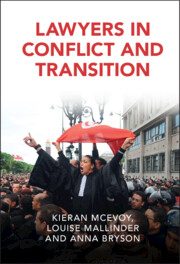Book contents
- Lawyers in Conflict and Transition
- Cambridge Studies in Law and Society
- Lawyers in Conflict and Transition
- Copyright page
- Dedication
- Epigraph
- Contents
- Acknowledgements
- Abbreviations
- Chapter 1 Lawyers in Conflict and Transition
- Chapter 2 Cause Lawyers, Political Violence, and Professionalism in Conflict
- Chapter 3 Boycott, Resistance, and the Law
- Chapter 4 Gender and Cause Lawyering in Conflicted, Authoritarian, and Transitional Societies
- Chapter 5 Government Lawyers in Conflict, Repression, and Transition
- Chapter 6 Lawyers in Transitional Political Negotiations
- Chapter 7 Lawyers, Transitional Justice, and Dealing with the Past
- Chapter 8 Conclusion
- Appendices
- Bibliography
- Index
- Cambridge Studies in Law and Society
Chapter 7 - Lawyers, Transitional Justice, and Dealing with the Past
Published online by Cambridge University Press: 17 March 2022
- Lawyers in Conflict and Transition
- Cambridge Studies in Law and Society
- Lawyers in Conflict and Transition
- Copyright page
- Dedication
- Epigraph
- Contents
- Acknowledgements
- Abbreviations
- Chapter 1 Lawyers in Conflict and Transition
- Chapter 2 Cause Lawyers, Political Violence, and Professionalism in Conflict
- Chapter 3 Boycott, Resistance, and the Law
- Chapter 4 Gender and Cause Lawyering in Conflicted, Authoritarian, and Transitional Societies
- Chapter 5 Government Lawyers in Conflict, Repression, and Transition
- Chapter 6 Lawyers in Transitional Political Negotiations
- Chapter 7 Lawyers, Transitional Justice, and Dealing with the Past
- Chapter 8 Conclusion
- Appendices
- Bibliography
- Index
- Cambridge Studies in Law and Society
Summary
This chapter examines the role of lawyers in attempting to deal with the past through processes and institutions commonly referred to as ‘transitional justice’. First, we offer a brief overview of the evolution of transitional justice as a field of theory and practice. We then examine the role of lawyers in helping to shape transitional justice efforts, focusing on legalism and its consequences for the efficacy of transitional justice. We explore in particular the role of lawyers in the truth commissions of Chile and South Africa – including in the latter context the work of the Amnesty Committee element of the Truth and Reconciliation Commission (TRC). We then examine the efforts of lawyers to use prosecutions and litigation to hold accountable those guilty of past human rights violations in Chile, South Africa, and Tunisia. In the last context, we were particularly interested in the role of the Tunisian Bar Association as a transitional justice driver. Finally, we reflect on lawyers as objects of transitional justice – wherein the legal profession itself is held to scrutiny for past actions during periods of conflict and authoritarianism.
- Type
- Chapter
- Information
- Lawyers in Conflict and Transition , pp. 228 - 297Publisher: Cambridge University PressPrint publication year: 2022

